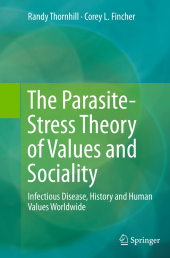 Neuerscheinungen 2016Stand: 2020-02-01 |
Schnellsuche
ISBN/Stichwort/Autor
|
Herderstraße 10
10625 Berlin
Tel.: 030 315 714 16
Fax 030 315 714 14
info@buchspektrum.de |

Corey L. Fincher, Randy Thornhill
(Beteiligte)
The Parasite-Stress Theory of Values and Sociality
Infectious Disease, History and Human Values Worldwide
Softcover reprint of the original 1st ed. 2014. 2016. xix, 449 S. 12 SW-Abb., 11 Tabellen. 235 mm
Verlag/Jahr: SPRINGER, BERLIN; SPRINGER INTERNATIONAL PUBLISHING 2016
ISBN: 3-319-35659-3 (3319356593)
Neue ISBN: 978-3-319-35659-4 (9783319356594)
Preis und Lieferzeit: Bitte klicken
This book develops and tests an ecological and evolutionary theory of the causes of human values-the core beliefs that guide people´s cognition and behavior-and their variation across time and space around the world. We call this theory the parasite-stress theory of values or the parasite-stress theory of sociality. The evidence we present in our book indicates that both a wide span of human affairs and major aspects of human cultural diversity can be understood in light of variable parasite (infectious disease) stress and the range of value systems evoked by variable parasite stress. The same evidence supports the hypothesis that people have psychological adaptations that function to adopt values dependent upon local infectious-disease adversity. The authors have identified key variables, variation in infectious disease adversity and in the core values it evokes, for understanding these topics and in novel and encompassing ways. Although the human species is the focus in the book, evidence presented in the book shows that the parasite-stress theory of sociality informs other topics in ecology and evolutionary biology such as variable family organization and speciation processes and biological diversity in general in non-human animals.
1. Background and Overview of the Book.- 2. Evolutionary Aesthetics, Values and Methodology.- 3. The Parasite-stress Theory of Values.- 4. Human Values Research Prior ro the Parasite-stress Theory.- 5.Collectivism-Individualism, Family Ties and Philopatry.- 6. Mating Systems, Mate Choice, Marriage, Sexual Behavior and Inbreeding.- 7. Personality.- 8. Interpersonal Violence.- 9. Religiosity.- 10. Democracy and Other Governmental Systems.- 11. Economics, Values and Cognitive Ability.- 12. Wars, Revolutions and Coups, and the Absence of Peace across the World.- 13. Biodiversity and the Parasite-driven Wedge.- 14. Reflections, Criticisms, and Future Research.
"The book might appeal to academics looking for an introduction to this research program, for example, psychologists, anthropologists, sociologists, or political scientists concerned with cultural differences and seeking an alternative perspective. ... The volume has much to offer for fans of consilience. ... The book also has much to offer for those skeptical of parasite stress having such encompassing effects on culture as well as for those skeptical of the psychological processes claimed to cause the cultural variation." (Florian van Leeuwen, The Quarterly Review of Biology, Vol. 91 (2), June, 2016)
Randy Thornhill is Distinguished Professor of Biology at The University of New Mexico. Dr. Thornhill´s 150+ published papers and four books on the evolutionary and ecological aspects of sociality and behavior have been cited over 17,000 times. He served as President of the Human Behavior and Evolution Society from 2011 through 2013. Corey L. Fincher is an Assistant Professor in the University of Warwick, U.K.´s Department of Psychology. The parasite-stress model emerged as a result of his and Thornhill´s research, and the two researchers´ publications since 2005 established this theory of sociality.


